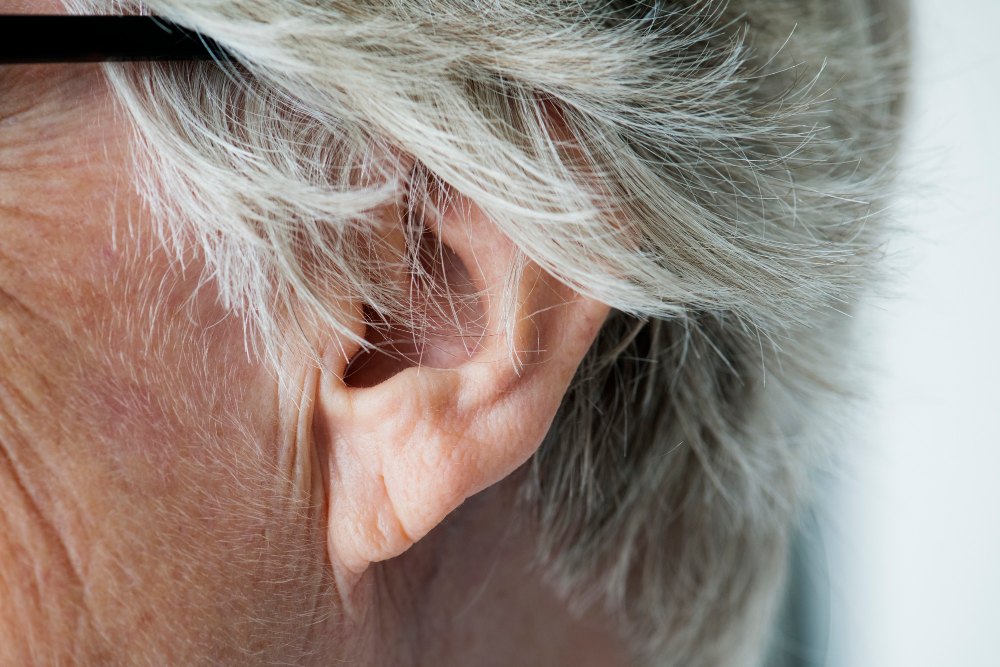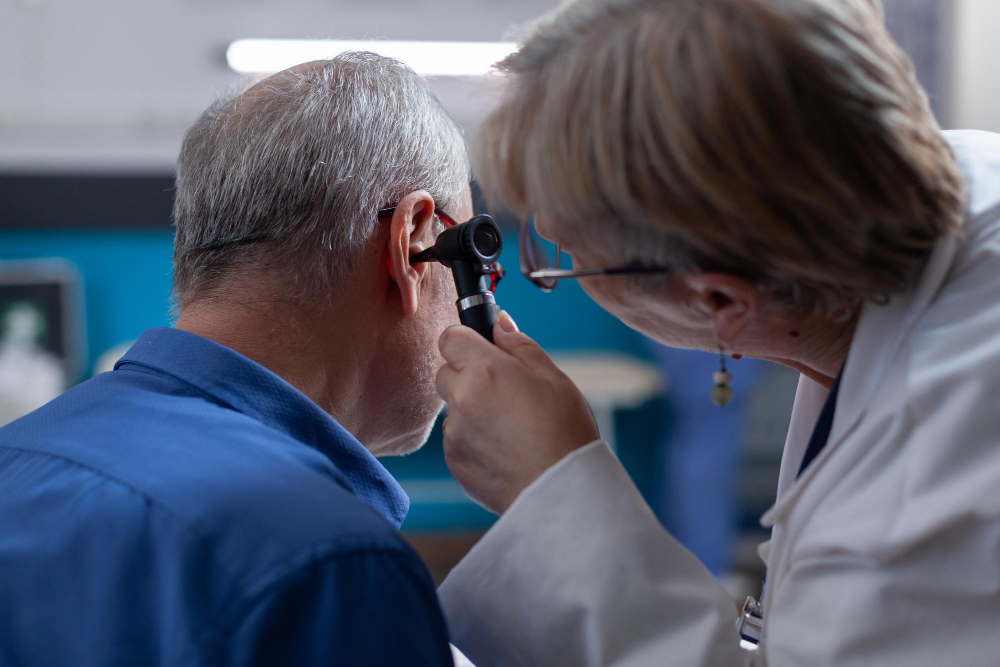What are the signs of hearing loss — and when should you get tested?
Noticing changes in your hearing? Learn the signs and when to take action.

Hearing is something we take for granted, until it becomes harder to catch what someone said, or you realize the TV is way too loud for everyone else in the room.
Hearing loss can come on suddenly, but for many people, it’s gradual. It may start as missing words in noisy places or struggling to hear certain voices. While hearing loss is common as we get older, it’s not something to ignore. In fact, more than half of adults 75 or older experience some level of hearing loss.
Catching the signs of hearing loss early makes a huge difference. Hearing loss can affect relationships, social life, and even brain health. The good news? It’s manageable, and taking the first step in early detection — like scheduling a hearing test — can help improve your quality of life.
The 3 key takeaways
- Hearing loss often starts gradually — making it easy to miss early signs.
- Symptoms can vary by age or type, from missed speech milestones to social fatigue.
- Early testing leads to better outcomes — hearing loss is manageable with the right support.
Recognizing the signs of hearing loss
Hearing loss often develops so gradually that many people do not notice it right away. It is common to adjust to small changes without realizing something has shifted. That is why it helps to recognize early signs before they begin to disrupt your daily life.
The following symptoms may show up in hearing loss, especially if they happen more often or begin to affect your routine:
- Trouble understanding speech, especially in noisy places like restaurants or family gatherings.
- Frequently asking others to repeat themselves or speak more clearly.
- Turning up the volume on the TV, your phone, or radio higher than others around you prefer.
- Difficulty hearing high-pitched sounds like doorbells, alarms, or children’s voices.
- Feeling like people are mumbling, even when they are speaking clearly.
- Becoming tired or frustrated during conversations because of the effort it takes to listen.
- Withdrawing from social situations or avoiding phone calls due to trouble hearing.
- Experiencing ringing, buzzing, or hissing in the ears (also known as tinnitus).
“People typically notice hearing loss through various signs and behaviors in their day-to-day lives, including difficulty understanding speech, asking people to repeat themselves, and turning up the volume.” ~ Dr. Reisman, AuD
Age-specific symptoms
Signs of hearing loss show up differently at each stage of life. Here’s what to look for across different age groups.
In Babies
Babies go through key milestones that involve responding to sound. A lack of response can be an early sign of hearing concerns. Some signs include:
- Not being startled by loud sounds.
- Not turning toward the source of a sound by 4 months of age.
- Not babbling or saying simple words like “mama” or “dada” by age 1.
- Not reacting to their name being called.
- Responding to visual cues but not to voices or sounds.
In Children
Hearing loss in children can affect speech, behaviour, and learning. Signs can include:
- Delays in speech development or unclear speech.
- Turning up the volume on devices more than usual.
- Talking very loudly or not responding when called.
- Often asking for repetition or seeming not to hear.
- Relying on watching others to follow instructions.
In Adults
The early signs of hearing loss in adults are often subtle and easy to overlook. If you’re unsure whether something is worth checking out, take another look at the list of common symptoms to look for. Many adults first notice issues like social fatigue, turning up the volume, or feeling like others are mumbling.
“Feeling isolated or withdrawn from social situations due to difficulty following conversations is a common sign of hearing loss.” ~ Dr. Reisman, AuD
Symptoms by type of hearing loss
Understanding the different types of hearing loss can help explain why symptoms are different for everyone. Each type of hearing loss affects a different part of the ear and can lead to its own set of challenges.
Conductive Hearing Loss
This type involves the outer or middle ear and is often caused by blockages, fluid, or structural issues. It may feel like sounds are muffled or distant, and may include a sense of fullness in the ear.
Sensorineural Hearing Loss
The most common type, this occurs with damage to the inner ear or auditory nerve. It often causes trouble understanding speech, especially in noisy environments. Symptoms like tinnitus or difficulty hearing high-pitched sounds may occur.
Mixed Hearing Loss
This type of hearing loss includes a mix of symptoms such as muffled sound, distorted speech, or persistent ringing. This hearing loss often fluctuates with overall health or environment.
“Some people might have hearing loss that is mild or situational, and they may manage with strategies or devices like personal amplifiers rather than full hearing aids.” ~ Dr. Reisman, AuD
What to do if you’re experiencing hearing loss
Hearing loss is diagnosed through a professional hearing test called an audiogram. This painless, in-office exam helps determine whether you have hearing loss, how mild or severe it is, and what type you may be experiencing. From there, your audiologist can guide you toward the best next steps.
When to see a specialist
If you’re noticing signs of hearing loss like turning up the TV or struggling to follow conversations, it is a good time to book a hearing test. Dr. Reisman encourages people to act early. “Even mild hearing loss can be identified early with a professional test,” she says.
Hearing well supports brain health, relationships, and quality of life. Testing is the first step toward understanding what is going on and finding out what options are available.
Use our Audiologist Explorer tool to find a professional near you and book an appointment.
What to expect when you see an audiologist
During your appointment, your audiologist will:
- Ask about your health history and hearing concerns.
- Look into your ears to check for blockages like earwax buildup.
- Use specialized equipment to measure how well you hear tones and speech at various volumes and pitches.
- Create an audiogram — a visual chart that maps your hearing levels.
You may also have time to ask questions. “Common ones include ‘Do I need hearing aids?’ or ‘Will this test tell me what’s causing my hearing loss?’” says Dr. Reisman.
What to do after an audiogram
Once your audiologist reviews your results, they will explain what they mean and walk you through your options. “Around 20 to 30 percent of people who get an audiogram will not require hearing aids,” Dr. Reisman notes. “Some might have hearing loss that is mild or situational, and they may manage with strategies or devices like personal amplifiers.”
Your doctor may ask you to track your hearing over time and make small changes like using captions or avoiding noisy environments. They may suggest a hearing aid or assistive device. If needed, your audiologist might also refer you to an ear, nose, and throat (ENT) specialist.
Treatment options
Treatment depends on the type and severity of hearing loss. In many cases, hearing aids are a helpful solution — but they are not the only one.
Dr. Reisman highlights several options beyond traditional hearing aids:
- Personal amplifiers: Useful for one-on-one conversations or specific settings.
- Captioning tools and apps: Helpful for TV, meetings, or group conversations.
- Cochlear implants: For those with severe-to-profound hearing loss who do not benefit from hearing aids.
- FM systems: Often used in classrooms or public places to amplify the speaker’s voice.
- Hearing loop systems: Installed in public venues and compatible with many hearing devices.
Your audiologist can recommend the right solution based on your lifestyle, preferences, and needs.
If hearing aids are among your options, it’s important to know how to choose the right hearing aid to address your specific level of hearing loss.
Causes of hearing loss and how to prevent it
Hearing loss can be caused by a variety of factors, from everyday noise exposure to underlying medical conditions. While not every case is preventable, there are steps you can take to protect your hearing and lower your risk over time..
Common Causes
Some causes of hearing loss are temporary and treatable. Others may result in permanent changes. Common causes include:
- Noise exposure: Loud sounds from concerts, construction, or earbuds can damage the inner ear.
- Aging: Gradual loss, especially of high-pitched sounds, is common with age.
- Earwax buildup: Can block sound and cause temporary hearing changes.
- Ear infections or fluid: Often affect the middle ear, especially in children.
- Medical conditions: Issues like diabetes or heart disease may impact hearing.
- Genetics: Family history can increase your risk.
- Medications: Some drugs can damage hearing as a side effect.
Dr. Reisman notes that “asymmetric loss” — where one ear hears significantly worse than the other — could signal a more serious medical issue and should be evaluated promptly.
Prevention Tips
You can reduce your risk of hearing loss by keeping volume levels in check, using ear protection in loud environments, and skipping cotton swabs or anything that might irritate the ear canal. Regular hearing checks and managing health conditions like diabetes or high blood pressure can also help. Tools like captions, amplified phones, and personal listening devices make daily hearing easier and safer.
“Promote the idea that hearing loss is common and treatable. Highlight the importance of early detection, especially for conditions like dementia, that may be associated with untreated hearing loss.” ~ Dr. Reisman, AuD
Conclusion
If you’ve started to notice changes in your own hearing, trust your instincts. Early testing can make a big difference. If someone close to you shows signs of hearing loss, your support can help them take the first step toward getting tested. Partners, family, and friends are often the first to notice the signs. Starting the conversation early can lead to better outcomes and a stronger quality of life.
Frequently Asked Questions
What is the first stage of hearing loss?
Hearing loss often begins with subtle changes like trouble hearing high-pitched sounds or following conversations in noisy settings. Fatigue after socializing is also a common early sign, especially if you are straining to listen for long periods.
Is hearing loss always permanent?
Not always. Some causes of hearing loss, such as ear infections, fluid in the ear, or wax buildup, are temporary and treatable. Other types, such as sensorineural hearing loss caused by aging or noise exposure, are more likely to be permanent. A hearing test will help determine the type and whether treatment might restore or improve your hearing.
What’s the difference between hearing loss and deafness?
Hearing loss is a partial reduction in hearing, which may range from mild to profound. Deafness usually means little to no hearing at all. Hearing loss can be supported with hearing aids or assistive devices. People who are deaf may rely more on alternative communication tools such as lip reading, captioning, or sign language.


